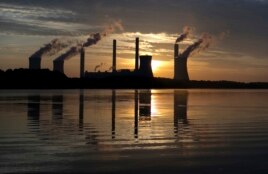19 March, 2019
As climate change becomes more widely taught in American classrooms, some politicians are fighting for lessons to include information outside of usual scientific theories.
A lawmaker from Connecticut wants to remove climate change from state science lessons. A legislator in Virginia worries that teachers are passing on their opinions, not facts, on global warming to their students. And an Oklahoma state senator wants educators to be able to put forward other differing ideas on climate change without fearing job loss.
Such efforts are becoming more and more common. The California-based nonprofit National Center for Science Education says more than 10 such bills have been proposed so far this year. That is more than the organization usually sees in a full year. It says the bills threaten the quality of science education in America.
Many of the measures proposed so far in 2019 were designed by two advocacy groups: the Discovery Institute and the Heartland Institute.
David Bullard, a Republican state senator from Oklahoma, is a former high school teacher. He proposed a bill based on suggested legislation from the Discovery Institute. Science teachers objected, however, and the bill did not move forward.
Bullard told the Associated Press, "You have to present two sides of the argument and allow the kids to deliberate."
Scientists and science education organizations, however, reject the idea that there are "two sides" to the issue.
"You can't talk about two sides when the other side doesn't have a foot in reality," said University of Illinois climate scientist Donald Wuebbles.

In this June, 3, 2017, file photo, the sun sets behind Georgia Power's coal-fired Plant Scherer, one of the nation's top carbon dioxide emitters, in Juliette, Ga. (AP Photo/Branden Camp, File)
More than 90 percent of the peer-reviewed studies and the scientists who write them say climate change is a human-caused problem.
An international group of Nobel-winning scientists has repeatedly published reports describing the science behind climate change. The scientists explain how the world is likely to pass a level of warming that an international agreement calls dangerous.
Last year, the U.S. government issued a detailed report saying that "climate-related threats to Americans' physical, social and economic well-being are rising."
Classroom teachings on global warming differ widely from state to state. However, climate change and the ways humans are changing the planet are central subjects in the Next Generation Science Standards. Nineteen American states and the District of Columbia use the standards. Twenty-one other states use some of the materials.
Some people who reject widely accepted climate science have called the debate an issue of academic freedom.
James Taylor is with Heartland, a group that dismisses climate change. He said Heartland supports inclusive classroom discussions on the issue.
In 2017, the group sent thousands of science teachers copies of a book called "Why Scientists Disagree About Global Warming."
Now, Heartland is more directly targeting its message to students. It is planning to publish a guide this year that says arguments linking climate change to extreme weather events such as hurricanes and tornadoes are not correct.
Taylor said, "We're very concerned the global warming propaganda efforts have encouraged students to not engage in research and critical thinking."
The Discovery Institute has offered model legislation. It says teachers should be permitted to discuss the strengths and weaknesses of evidence connected to global warming as well as evolution. Some states have passed similarly written measures in the past, including Tennessee in 2012 and Louisiana in 2008.
In other states, Discovery has urged legislators to consider unofficial resolutions in support of giving teachers freedom to "show support for critical thinking" on dividing issues. Lawmakers in Alabama and Indiana passed such resolutions in 2017.
Discovery officials did not answer a request for comment from the Associated Press.
Florida state senator Dennis Baxley, a Republican, is supporting legislation that would permit schools to teach alternatives to disputed theories.
"There is really no established science on most things, you'll find," Baxley said.
Although many details about climate science are hotly debated among scientists, it is well established that global warming is real, human-caused and a problem, said scientist Chris Field. He is director of the Stanford Woods Institute for the Environment.
Field said, "When people say we ought to present two sides, they're saying we ought to present a side that's totally been disproven along with a side that has been fundamentally supported by the evidence."
I'm Caty Weaver.
And I'm Ashley Thompson.
The Associated Press reported this story. Ashley Thompson adapted it for VOA Learning English. Caty Weaver was the editor.
_____________________________________________________________
Words in This Story
allow - v. to permit
deliberate - v. done or said in a way that is planned or intended : done or said on purpose
peer review - n. a process by which a scholarly work (such as a paper or a research proposal) is checked by a group of experts in the same field to make sure it meets the necessary standards before it is published or accepted
academic - adj. of or relating to schools and education
engage in - phrasal verb. to do (something)
encourage - v. to make (someone) more likely to do something
evolution - n. a theory that the differences between modern plants and animals are because of changes that happened by a natural process over a very long time
fundamentally - adv. at the most basic level
alternative - n. not usual or traditional